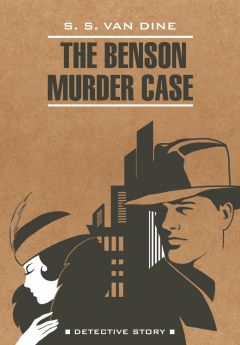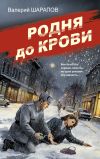
Автор книги: Стивен Ван Дайн
Жанр: Иностранные языки, Наука и Образование
Возрастные ограничения: +16
сообщить о неприемлемом содержимом
Текущая страница: 6 (всего у книги 18 страниц)
Markham rose and, bowing with formal courtesy, indicated a comfortable upholstered chair directly in front of his desk. With a barely perceptible nod, she glanced at the chair, and then seated herself in a straight armless chair standing next to it.
“You won’t mind, I’m sure,” she said, “if I choose my own chair for the inquisition.”
Her voice was low and resonant—the speaking voice of the highly trained singer. She smiled as she spoke, but it was not a cordial smile: it was cold and distant, yet somehow indicative of levity.
“Miss St. Clair,” began Markham, in a tone of polite severity, “the murder of Mr. Alvin Benson has intimately involved yourself. Before taking any definite steps, I have invited you here to ask you a few questions. I can, therefore, advise you quite honestly that frankness will best serve your interests.”
He paused, and the woman looked at him with an ironically questioning gaze.
“Am I supposed to thank you for your generous advice?”
Markham’s scowl deepened as he glanced down at a typewritten page on his desk.
“You are probably aware that your gloves and hand-bag were found in Mr. Benson’s house the morning after he was shot.”
“I can understand how you might have traced the hand-bag to me,” she said; “but how did you arrive at the conclusion that the gloves were mine?”
Markham looked up sharply.
“Do you mean to say the gloves are not yours?”
“Oh, no.” She gave him another wintry smile. “I merely wondered how you knew they belonged to me, since you couldn’t have known either my taste in gloves or the size I wore.”
“They’re your gloves, then?”
“If they are Tréfousse, size five-and-three-quarters, of white kid and elbow length, they are certainly mine. And I’d so like to have them back, if you don’t mind.”
“I’m sorry,” said Markham; “but it is necessary that I keep them for the present.”
She dismissed the matter with a slight shrug of the shoulders.
“Do you mind if I smoke?” she asked.
Markham instantly opened a drawer of his desk, and took out a box of Benson and Hedges cigarettes.
“I have my own, thank you,” she informed him. “But I would so appreciate my holder. I’ve missed it horribly.”
Markham hesitated. He was manifestly annoyed by the woman’s attitude.
“I’ll be glad to lend it to you,” he compromised; and reaching into another drawer of his desk, he laid the holder on the table before her.
“Now, Miss St. Clair,” he said, resuming his gravity of manner, “will you tell me how these personal articles of yours happened to be in Mr. Benson’s living-room?”
“No, Mr. Markham, I will not,” she answered.
“Do you realize the serious construction your refusal places upon the circumstances?”
“I really hadn’t given it much thought.” Her tone was indifferent.
“It would be well if you did,” Markham advised her. “Your position is not an enviable one; and the presence of your belongings in Mr. Benson’s room is, by no means, the only thing that connects you directly with the crime.”
The woman raised her eyes inquiringly, and again the enigmatic smile appeared at the corners of her mouth.
“Perhaps you have sufficient evidence to accuse me of the murder?”
Markham ignored this question.
“You were well acquainted with Mr. Benson, I believe?”
“The finding of my hand-bag and gloves in his apartment might lead one to assume as much, mightn’t it?” she parried.
“He was, in fact, much interested in you?” persisted Markham.
She made a moue[61]61
moue (фр.) —недовольная гримаса
[Закрыть], and sighed.
“Alas, yes! Too much for my peace of mind. … Have I been brought here to discuss the attentions this gentleman paid me?”
Again Markham ignored her query.
“Where were you, Miss St. Clair, between the time you left the Marseilles at midnight and the time you arrived home—which, I understand, was after one o’clock?”
“You are simply wonderful!” she exclaimed. “You seem to know everything. … Well, I can only say that during that time I was on my way home.”
“Did it take you an hour to go from Fortieth Street to Eighty-first and Riverside Drive?”
“Just about, I should say,—a few minutes more or less, perhaps.”
“How do you account for that?” Markham was becoming impatient.
“I can’t account for it,” she said, “except by the passage of time. Time does fly, doesn’t it, Mr. Markham?”
“By your attitude you are only working detriment to yourself,” Markham warned her, with a show of irritation. “Can you not see the seriousness of your position? You are known to have dined with Mr. Benson, to have left the restaurant at midnight, and to have arrived at your own apartment after one o’clock. At twelve-thirty, Mr. Benson was shot; and your personal articles were found in the same room the morning after.”
“It looks terribly suspicious, I know,” she admitted, with whimsical seriousness. “And I’ll tell you this, Mr. Markham: if my thoughts could have killed Mr. Benson, he would have died long ago. I know I shouldn’t speak ill of the dead—there’s a saying about it beginning ‘de mortuis,’ isn’t there?—but the truth is, I had reason to dislike Mr. Benson exceedingly.”
“Then why did you go to dinner with him?”
“I’ve asked myself the same question a dozen times since,” she confessed dolefully. “We women are such impulsive creatures—always doing things we shouldn’t. … But I know what you’re thinking:—if I had intended to shoot him, that would have been a natural preliminary. Isn’t that what’s in your mind? I suppose all murderesses do go to dinner with their victims first.”
While she spoke she opened her vanity-case and looked at her reflection in its mirror. She daintily adjusted several imaginary stray ends of her abundant dark-brown hair, and touched her arched eyebrows gently with her little finger as if to rectify some infinitesimal disturbance in their pencilled contour. Then she tilted her head, regarded herself appraisingly, and returned her gaze to the District Attorney only as she came to the end of her speech. Her actions had perfectly conveyed to her listeners the impression that the subject of the conversation was, in her scheme of things, of secondary importance to her personal appearance. No words could have expressed her indifference so convincingly as had her little pantomime.
Markham was becoming exasperated. A different type of district attorney would no doubt have attempted to use the pressure of his office to force her into a more amenable frame of mind. But Markham shrank instinctively from the bludgeoning, threatening methods of the ordinary Public Prosecutor, especially in his dealings with women. In the present case, however, had it not been for Vance’s strictures at the Club, he would no doubt have taken a more aggressive stand. But it was evident he was laboring under a burden of uncertainty superinduced by Vance’s words and augmented by the evasive deportment of the woman herself.
After a moment’s silence he asked grimly:
“You did considerable speculating through the firm of Benson and Benson, did you not?”
A faint ring of musical laughter greeted this question.
“I see that the dear Major has been telling tales. … Yes, I’ve been gambling most extravagantly. And I had no business to do it. I’m afraid I’m avaricious.”
“And is it not true that you’ve lost heavily of late—that, in fact, Mr. Alvin Benson called upon you for additional margin and finally sold out your securities?”
“I wish to Heaven it were not true,” she lamented, with a look of simulated tragedy. Then: “Am I supposed to have done away with Mr. Benson out of sordid revenge, or as an act of just retribution?” She smiled archly and waited expectantly, as if her question had been part of a guessing game.
Markham’s eyes hardened as he coldly enunciated his next words.
“Is it not a fact that Captain Philip Leacock owned just such a pistol as Mr. Benson was killed with—a forty-five army Colt automatic?”
At the mention of her fiancé’s name she stiffened perceptibly and caught her breath. The part she had been playing fell from her, and a faint flush suffused her cheeks and extended to her forehead. But almost immediately she had reassumed her rôle of playful indifference.
“I never inquired into the make or calibre of Captain Leacock’s fire-arms,” she returned carelessly.
“And is it not a fact,” pursued Markham’s imperturbable voice, “that Captain Leacock lent you his pistol when he called at your apartment on the morning before the murder?”
“It’s most ungallant of you, Mr. Markham,” she reprimanded him coyly, “to inquire into the personal relations of an engaged couple; for I am betrothed to Captain Leacock—though you probably know it already.”
Markham stood up, controlling himself with effort.
“Am I to understand that you refuse to answer any of my questions, or to endeavor to extricate yourself from the very serious position you are in?”
She appeared to consider.
“Yes,” she said slowly, “I haven’t anything I care especially to say just now.”
Markham leaned over and rested both hands on the desk.
“Do you realize the possible consequences of your attitude?” he asked ominously. “The facts I know regarding your connection with the case, coupled with your refusal to offer a single extenuating explanation, give me more grounds than I actually need to order your being held.”
I was watching her closely as he spoke, and it seemed to me that her eyelids drooped involuntarily the merest fraction of an inch. But she gave no other indication of being affected by the pronouncement, and merely looked at the District Attorney with an air of defiant amusement.
Markham, with a sudden contraction of the jaw, turned and reached toward a bell-button beneath the edge of his desk. But, in doing so, his glance fell upon Vance; and he paused indecisively. The look he had encountered on the other’s face was one of reproachful amazement: not only did it express complete surprise at his apparent decision, but it stated, more eloquently than words could have done, that he was about to commit an act of irreparable folly.
There were several moments of tense silence in the room. Then calmly and unhurriedly Miss St. Clair opened her vanity-case and powdered her nose. When she had finished, she turned a serene gaze upon the District Attorney.
“Well, do you want to arrest me now?” she asked.
Markham regarded her for a moment, deliberating. Instead of answering at once, he went to the window and stood for a full minute looking down upon the Bridge of Sighs which connects the Criminal Courts Building with the Tombs.
“No, I think not to-day,” he said slowly.
He stood a while longer in absorbed contemplation; then, as if shaking off his mood of irresolution, he swung about and confronted the woman.
“I’m not going to arrest you—yet,” he reiterated, a bit harshly. “But I’m going to order you to remain in New York for the present. And if you attempt to leave, you will be arrested. I hope that is clear.”
He pressed a button, and his secretary entered.
“Swacker, please escort Miss St. Clair downstairs, and call a taxicab for her. … Then you can go home yourself.”
She rose and gave Markham a little nod.
“You were very kind to lend me my cigarette-holder,” she said pleasantly, laying it on his desk.
Without another word, she walked calmly from the room.
The door had no more than closed behind her when Markham pressed another button. In a few moments the door leading into the outer corridor opened, and a white-haired, middle-aged man appeared.
“Ben,” ordered Markham hurriedly, “have that woman that Swacker’s taking downstairs followed. Keep her under surveillance, and don’t let her get lost. She’s not to leave the city—understand? It’s the St. Clair woman Tracy dug up.”
When the man had gone, Markham turned and stood glowering at Vance.
“What do you think of your innocent young lady now?” he asked, with an air of belligerent triumph.
“Nice gel—eh, what?” replied Vance blandly. “Extr’ordin’ry control. And she’s about to marry a professional milit’ry man! Ah, well. De gustibus[62]62
De gustibus … (лат.) —сокр. от крылатого выражения de gustibus non est disputandum — о вкусах не спорят.
[Закрыть] … Y’ know, I was afraid for a moment you were actu’lly going to send for the manacles. And if you had, Markham old dear, you’d have regretted it to your dying day.”
Markham studied him for a few seconds. He knew there was something more than a mere whim beneath Vance’s certitude of manner; and it was this knowledge that had stayed his hand when he was about to have the woman placed in custody.
“Her attitude was certainly not conducive to one’s belief in her innocence,” Markham objected. “She played her part damned cleverly, though. But it was just the part a shrewd woman, knowing herself guilty, would have played.”
“I say, didn’t it occur to you,” asked Vance, “that perhaps she didn’t care a farthing whether you thought her guilty or not?—that, in fact, she was a bit disappointed when you let her go?”
“That’s hardly the way I read the situation,” returned Markham. “Whether guilty or innocent, a person doesn’t ordinarily invite arrest.”
“By the bye,” asked Vance, “where was the fortunate swain during the hour of Alvin’s passing?”
“Do you think we didn’t check up on that point?” Markham spoke with disdain. “Captain Leacock was at his own apartment that night from eight o’clock on.”
“Was he, really?” airily retorted Vance. “A most model young fella!”
Again Markham looked at him sharply.
“I’d like to know what weird theory has been struggling in your brain to-day,” he mused. “Now that I’ve let the lady go temporarily—which is what you obviously wanted me to do—, and have stultified my own better judgment in so doing, why not tell me frankly what you’ve got up your sleeve?”
“‘Up my sleeve?’ Such an inelegant metaphor! One would think I was a prestidig’tator, what?”
Whenever Vance answered in this fashion it was a sign that he wished to avoid making a direct reply; and Markham dropped the matter.
“Anyway,” he submitted, “you didn’t have the pleasure of witnessing my humiliation, as you prophesied.”
Vance looked up in simulated surprise.
“Didn’t I, now?” Then he added sorrowfully: “Life is so full of disappointments, y’ know.”
Chapter VIII. Vance Accepts a Challenge
(Saturday, June 15; 4 p.m.)
After Markham had telephoned Heath the details of the interview, we returned to the Stuyvesant Club. Ordinarily the District Attorney’s office shuts down at one o’clock on Saturdays; but to-day the hour had been extended because of the importance attaching to Miss St. Clair’s visit. Markham had lapsed into an introspective silence which lasted until we were again seated in the alcove of the Club’s lounge-room. Then he spoke irritably.
“Damn it! I shouldn’t have let her go. … I still have a feeling she’s guilty.”
Vance assumed an air of gushing credulousness.
“Oh, really? I dare say you’re so psychic. Been that way all your life, no doubt. And haven’t you had lots and lots of dreams that came true? I’m sure you’ve often had a ’phone call from someone you were thinking about at the moment. A delectable gift. Do you read palms, also? … Why not have the lady’s horoscope cast?”
“I have no evidence as yet,” Markham retorted, “that your belief in her innocence is founded on anything more substantial than your impressions.”
“Ah, but it is,” averred Vance. “I know she’s innocent. Furthermore, I know that no woman could possibly have fired the shot.”
“Don’t get the erroneous idea in your head that a woman couldn’t have manipulated a forty-five army Colt.”
“Oh, that?” Vance dismissed the notion with a shrug. “The material indications of the crime don’t enter into my calculations, y’ know,—I leave ’em entirely to you lawyers and the lads with the bulging deltoids. I have other, and surer, ways of reaching conclusions. That’s why I told you that if you arrested any woman for shooting Benson you’d be blundering most shamefully.”
Markham grunted indignantly.
“And yet you seem to have repudiated all processes of deduction whereby the truth may be arrived at. Have you, by any chance, entirely renounced your faith in the operations of the human mind?”
“Ah, there speaks the voice of God’s great common people!” exclaimed Vance. “Your mind is so typical, Markham. It works on the principle that what you don’t know isn’t knowledge, and that, since you don’t understand a thing, there is no explanation. A comfortable point of view. It relieves one from all care and uncertainty. Don’t you find the world a very sweet and wonderful place?”
Markham adopted an attitude of affable forbearance.
“You spoke at lunch time, I believe, of one infallible method of detecting crime. Would you care to divulge this profound and priceless secret to a mere district attorney?”
Vance bowed with exaggerated courtesy.[63]63
The following conversation in which Vance explains his psychological methods of criminal analysis, is, of course, set down from memory. However, a proof of this passage was sent to him with a request that he revise and alter it in whatever manner he chose; so that, as it now stands, it describes Vance’s theory in practically his own words.
[Закрыть]
“Delighted, I’m sure,” he returned. “I referred to the science of individual character and the psychology of human nature. We all do things, d’ ye see, in a certain individual way, according to our temp’raments. Every human act—no matter how large or how small—is a direct expression of a man’s personality, and bears the inev’table impress of his nature. Thus, a musician, by looking at a sheet of music, is able to tell at once whether it was composed, for example, by Beethoven, or Schubert, or Debussy, or Chopin. And an artist, by looking at a canvas, knows immediately whether it is a Corot, a Harpignies, a Rembrandt, or a Franz Hals. And just as no two faces are exactly alike, so no two natures are exactly alike: the combination of ingredients which go to make up our personalities, varies in each individual. That is why, when twenty artists, let us say, sit down to paint the same subject, each one conceives and executes it in a different manner. The result in each case is a distinct and unmistakable expression of the personality of the painter who did it. … It’s really rather simple, don’t y’ know.”
“Your theory, doubtless, would be comprehensible to an artist,” said Markham, in a tone of indulgent irony. “But its metaphysical refinements are, I admit, considerably beyond the grasp of a vulgar worldling like myself.”
“‘The mind inclined to what is false rejects the nobler course,’” murmured Vance, with a sigh.
“There is,” argued Markham, “a slight difference between art and crime.”
“Psychologically, old chap, there’s none,” Vance amended evenly. “Crimes possess all the basic factors of a work of art—approach, conception, technique, imagination, attack, method, and organization. Moreover, crimes vary fully as much in their manner, their aspects, and their general nature, as do works of art. Indeed, a carefully planned crime is just as direct an expression of the individual as is a painting, for instance. And therein lies the one great possibility of detection. Just as an expert aesthetician can analyze a picture and tell you who painted it, or the personality and temp’rament of the person who painted it, so can the expert psychologist analyze a crime and tell you who committed it—that is, if he happens to be acquainted with the person—, or else can describe to you, with almost mathematical surety, the criminal’s nature and character. … And that, my dear Markham, is the only sure and inev’table means of determining human guilt. All others are mere guess-work, unscientific, uncertain, and—perilous.”
Throughout this explanation Vance’s manner had been almost casual; yet the very serenity and assurance of his attitude conferred upon his words a curious sense of authority. Markham had listened with interest, though it could be seen that he did not regard Vance’s theorizing seriously.
“Your system ignores motive altogether,” he objected.
“Naturally,” Vance replied, “—since it’s an irrelevant factor in most crimes. Every one of us, my dear chap, has just as good a motive for killing at least a score of men, as the motives which actuate ninety-nine crimes out of a hundred. And, when anyone is murdered, there are dozens of innocent people who had just as strong a motive for doing it as had the actual murderer. Really, y’ know, the fact that a man has a motive is no evidence whatever that he’s guilty,—such motives are too universal a possession of the human race. Suspecting a man of murder because he has a motive is like suspecting a man of running away with another man’s wife because he has two legs. The reason that some people kill and others don’t, is a matter of temp’rament—of individual psychology. It all comes back to that… And another thing: when a person does possess a real motive—something tremendous and overpowering—he’s pretty apt to keep it to himself, to hide it and guard it carefully—eh, what? He may even have disguised the motive through years of preparation; or the motive may have been born within five minutes of the crime through the unexpected discovery of facts a decade old. … So, d’ ye see, the absence of any apparent motive in a crime might be regarded as more incriminating than the presence of one.”
“You are going to have some difficulty in eliminating the idea of cui bono[64]64
cui bono (лат.) —досл. кому выгодно?; юридический термин для определения подозреваемых в преступлении
[Закрыть] from the consideration of crime.”
“I dare say,” agreed Vance. “The idea of cui bono is just silly enough to be impregnable. And yet, many persons would be benefited by almost anyone’s death. Kill Sumner, and, on that theory, you could arrest the entire membership of the Authors’ League.”
“Opportunity, at any rate,” persisted Markham, “is an insuperable factor in crime,—and by opportunity, I mean that affinity of circumstances and conditions which make a particular crime possible, feasible and convenient for a particular person.”
“Another irrelevant factor,” asserted Vance. “Think of the opportunities we have every day to murder people we dislike! Only the other night I had ten insuff’rable bores to dinner in my apartment—a social devoir. But I refrained—with consid’rable effort, I admit—from putting arsenic in the Pontet Canet. The Borgias and I, y’ see, merely belong in different psychological categ’ries. On the other hand, had I been resolved to do murder, I would—like those resourceful cinquecento[65]65
cinquecento (итал.) – пятьсот; пятисотые годы, итальянское название XVI века
[Закрыть] patricians—have created my own opportunity. … And there’s the rub:—one can either make an opportunity or disguise the fact that he had it, with false alibis and various other tricks. You remember the case of the murderer who called the police to break into his victim’s house before the latter had been killed, saying he suspected foul play, and who then preceded the policemen indoors and stabbed the man as they were trailing up the stairs.”[66]66
I don’t know what case Vance was referring to; but there are several instances of this device on record, and writers of detective fiction have often used it. The latest instance is to be found in G. K. Chesterton’s The Innocence of Father Brown, in the story entitled “The Wrong Shape.”
[Закрыть]
“Well, what of actual proximity, or presence,—the proof of a person being on the scene of the crime at the time it was committed?”
“Again misleading,” Vance declared. “An innocent person’s presence is too often used as a shield by the real murderer who is actu’lly absent. A clever criminal can commit a crime from a distance through an agency that is present. Also, a clever criminal can arrange an alibi and then go to the scene of the crime disguised and unrecognized. There are far too many convincing ways of being present when one is believed to be absent—and vice versa[67]67
vice versa (лат.) —наоборот, в обратном направлении
[Закрыть]. … But we can never part from our individualities and our natures. And that is why all crime inev’tably comes back to human psychology—the one fixed, undisguisable basis of deduction.”
“It’s a wonder to me,” said Markham, “in view of your theories, that you don’t advocate dismissing nine-tenths of the police force and installing a gross or two of those psychological machines so popular with the Sunday Supplement editor.”
Vance smoked a minute meditatively.
“I’ve read about ’em. Int’restin’ toys. They can no doubt indicate a certain augmented emotional stress when the patient transfers his attention from the pious platitudes of Dr. Frank Crane to a problem in spherical trigonometry. But if an innocent person were harnessed up to the various tubes, galvanometers, electro-magnets, glass plates, and brass knobs of one of these apparatuses, and then quizzed about some recent crime, your indicat’ry needle would cavort about like a Russian dancer as a result of sheer nervous panic on the patient’s part.”
Markham smiled patronizingly.
“And I suppose the needle would remain static with a guilty person in contact?”
“Oh, on the contr’ry.” Vance’s tone was unruffled. “The needle would bob up and down just the same—but not because he was guilty. If he was stupid, for instance, the needle would jump as a result of his resentment at a seemingly newfangled third-degree torture. And if he was intelligent, the needle would jump because of his suppressed mirth at the puerility of the legal mind for indulging in such nonsense.”
“You move me deeply,” said Markham. “My head is spinning like a turbine. But there are those of us poor worldlings who believe that criminality is a defect of the brain.”
“So it is,” Vance readily agreed. “But unfortunately the entire human race possesses the defect. The virtuous ones haven’t, so to speak, the courage of their defects. … However, if you were referring to a criminal type, then, alas! we must part company. It was Lombroso, that darling of the yellow journals, who invented the idea of the congenital criminal. Real scientists like DuBois, Karl Pearson and Goring have shot his idiotic theories full of holes.”[68]68
It was Pearson and Goring who, about twenty years ago, made an extensive investigation and tabulation of professional criminals in England, the results of which showed (1) that criminal careers began mostly between the ages of 16 and 21; (2) that over ninety per cent of criminals were mentally normal; and (3) that more criminals had criminal older brothers than criminal fathers.
[Закрыть]
“I am floored by your erudition,” declared Markham, as he signalled to a passing attendant and ordered another cigar. “I console myself, however, with the fact that, as a rule, murder will leak out.”
Vance smoked his cigarette in silence, looking thoughtfully out through the window up at the hazy June sky.
“Markham,” he said at length, “the number of fantastic ideas extant about criminals is pos’tively amazing. How a sane person can subscribe to that ancient hallucination that ‘murder will out’ is beyond me. It rarely ‘outs’, old dear. And, if it did ‘out’, why a Homicide Bureau? Why all this whirlin’-dervish activity by the police whenever a body is found? … The poets are to blame for this bit of lunacy. Chaucer probably started it with his ‘Mordre wol out’, and Shakespeare helped it along by attributing to murder a miraculous organ that speaks in lieu of a tongue. It was some poet, too, no doubt, who conceived the fancy that carcasses bleed at the sight of the murderer. … Would you, as the great Protector of the Faithful, dare tell the police to wait calmly in their offices, or clubs, or favorite beauty-parlors—or wherever policemen do their waiting—until a murder ‘outs’? Poor dear!—if you did, they’d ask the Governor for your detention as particeps criminis[69]69
particeps criminis (лат.) —соучастник преступления
[Закрыть], or apply for a de lunatico inquirendo[70]70
de lunatico inquirendo (лат.) – досл. расспросить о сумасшедшем; юр. психиатрическая экспертиза
[Закрыть].”[71]71
Sir Basil Thomson, K.C.B., former Assistant Commissioner of Metropolitan Police, London, writing in The Saturday Evening Post several years after this conversation, said: “Take, for example, the proverb that murder will out, which is employed whenever one out of many thousands of undiscovered murderers is caught through a chance coincidence that captures the popular imagination. It is because murder will not out that the pleasant shock of surprise when it does out calls for a proverb to enshrine the phenomenon. The poisoner who is brought to justice has almost invariably proved to have killed other victims without exciting suspicion until he has grown careless.”
[Закрыть]
Markham grunted good-naturedly. He was busy cutting and lighting his cigar.
“I believe you chaps have another hallucination about crime,” continued Vance, “—namely, that the criminal always returns to the scene of the crime. This weird notion is even explained on some recondite and misty psychological ground. But, I assure you, psychology teaches no such prepost’rous doctrine. If ever a murderer returned to the body of his victim for any reason other than to rectify some blunder he had made, then he is a subject for Broadmoor—or Bloomingdale. … How easy it would be for the police if this fanciful notion were true! They’d merely have to sit down at the scene of a crime, play bezique or Mah Jongg until the murderer returned, and then escort him to the bastille[72]72
bastille (фр.) —крепость, бастилия; зд. тюрьма
[Закрыть], what? The true psychological instinct in anyone having committed a punishable act, is to get as far away from the scene of it as the limits of this world will permit.”[73]73
In “Popular Fallacies About Crime” (Saturday Evening Post: April 21, 1923, p. 8) Sir Basil Thomson also upheld this point of view.
[Закрыть]
“In the present case, at any rate,” Markham reminded him, “we are neither waiting inactively for the murder to out, nor sitting in Benson’s living-room trusting to the voluntary return of the criminal.”
“Either course would achieve success as quickly as the one you are now pursuing,” Vance said.
“Not being gifted with your singular insight,” retorted Markham, “I can only follow the inadequate processes of human reasoning.”
“No doubt,” Vance agreed commiseratingly. “And the results of your activities thus far force me to the conclusion that a man with a handful of legalistic logic can successfully withstand the most obst’nate and heroic assaults of ordin’ry commonsense.”
Markham was piqued.
“Still harping on the St. Clair woman’s innocence, eh? However, in view of the complete absence of any tangible evidence pointing elsewhere, you must admit I have no choice of courses.”
“I admit nothing of the kind,” Vance told him; “for, I assure you, there is an abundance of evidence pointing elsewhere. You simply failed to see it.”
“You think so!” Vance’s nonchalant cocksureness had at last overthrown Markham’s equanimity. “Very well, old man; I hereby enter an emphatic denial to all your fine theories; and I challenge you to produce a single piece of this evidence which you say exists.”
He threw his words out with asperity, and gave a curt, aggressive gesture with his extended fingers, to indicate that, as far as he was concerned, the subject was closed.
Vance, too, I think, was pricked a little.
“Y’ know, Markham old dear, I’m no avenger of blood, or vindicator of the honor of society. The rôle would bore me.”
Markham smiled loftily, but made no reply.
Vance smoked meditatively for a while. Then, to my amazement, he turned calmly and deliberately to Markham, and said in a quiet, matter-of-fact voice:
“I’m going to accept your challenge. It’s a bit alien to my tastes; but the problem, y’ know, rather appeals to me: it presents the same diff’culties as the Concert Champêtre affair,—a question of disputed authorship, as it were.”[74]74
For years the famous Concert Champêtre in the Louvre was officially attributed to Titian. Vance, however, took it upon himself to convince the Curator, M. Lepelletier, that it was a Giorgione, with the result that the painting is now credited to that artist.
[Закрыть]
Markham abruptly suspended the motion of lifting his cigar to his lips. He had scarcely intended his challenge literally: it had been uttered more in the nature of a verbal defiance; and he scrutinized Vance a bit uncertainly. Little did he realize that the other’s casual acceptance of his unthinking and but half-serious challenge, was to alter the entire criminal history of New York.
“Just how do you intend to proceed?” he asked.
Vance waved his hand carelessly.
“Like Napoleon, [75]75
je m’engage, et puis je vois (фр.) —досл. сперва ввязываюсь, потом смотрю; выражение приписывается Наполеону Бонапарту, который утверждал, что сперва нужно ввязаться в битву, а потом думать, что делать дальше
[Закрыть]. However, I must have your word that you’ll give me every possible assistance, and will refrain from all profound legal objections.”
Markham pursed his lips. He was frankly perplexed by the unexpected manner in which Vance had met his defiance. But immediately he gave a good-natured laugh, as if, after all, the matter was of no serious consequence.
Правообладателям!
Это произведение, предположительно, находится в статусе 'public domain'. Если это не так и размещение материала нарушает чьи-либо права, то сообщите нам об этом.








































